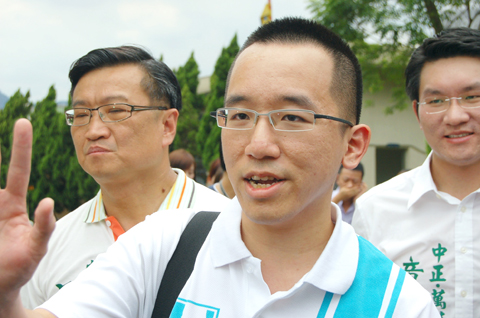The US is seeking to take over two properties in New York and Virginia owned by former president Chen Shui-bian (陳水扁) and his wife.
The US Justice Department filed complaints on Wednesday in New York and Virginia alleging part of US$6 million paid in bribes to Chen’s wife, Wu Shu-jen (吳淑珍), was used to purchase an apartment in Manhattan and a house in Keswick, Virginia. The complaints state that Yuanta Securities Co (元大證券) paid a bribe to ensure its bid to acquire additional shares in Fuhwa Financial Holding Co (復華金控) would not be blocked by authorities.
“A portion of these bribe proceeds were then transferred ... to the United States and used to purchase a condominium in Manhattan” and a house in Virginia, the complaints allege.

PHOTO: CNA
Chen and Wu were convicted last year of embezzling state funds, accepting bribes and money laundering, and sentenced to life in prison. The sentences were reduced to 20 years by an appeals court on June 11, although that verdict is being appealed by prosecutors.
Homeland Security Director for Immigration and Customs Enforcement John Morton said the complaints reflect the US’ determination not to allow itself to be abused by corrupt foreign officials.
“This serves as a warning to those ... officials who abuse their power for personal financial gain and then attempt to place those funds in the US financial system,” he said.
Chen was perplexed by the US request and urged the US judiciary to await the final court ruling on the “case of the second financial reform” before taking any action, the couple’s son, Chen Chih-chung (陳致中), said yesterday after visiting his father at the Taipei Detention Center in Tucheng (土城), Taipei County.
The former president was referring to the prosecutors’ allegation that he and his wife accepted bribes from banks in 2007 to “smooth” requirements at the time the government was implementing a second phase of financial reforms to encourage monetary institutions to merge.
Chen Chih-chung said he did not understand the US government’s “leap in thinking.”
“Maybe the US government did not have sufficient information before it made the decision,” he said. “Such a decision was arbitrary.”
Chen Chih-chung said he suspects the US government made the request based on the “second financial reform case.”
However, before Taipei District Court hands down its verdict in that case, the US could not be sure if the money used to buy the properties was dirty, he said.
The Presidential Office and the American Institute in Taiwan (AIT) both declined to comment yesterday. Presidential Office Spokesman Lo Chih-chiang (羅智強) said President Ma Ying-jeou (馬英九) would not intervene in an ongoing case.
“This is a case where Department of Justice is working with Taiwan authorities ... I cannot comment on the specifics of an ongoing case,” AIT spokesperson Sheila Pasksman said.
Meanwhile, Ministry of Foreign Affairs Spokesman Henry Chen (陳銘政) said the ministry respected the US judicial process and would provide any information the US requested, although it would not volunteer such information.
ADDITIONAL REPORTING BY SHIH HSIU-CHUAN

The CIA has a message for Chinese government officials worried about their place in Chinese President Xi Jinping’s (習近平) government: Come work with us. The agency released two Mandarin-language videos on social media on Thursday inviting disgruntled officials to contact the CIA. The recruitment videos posted on YouTube and X racked up more than 5 million views combined in their first day. The outreach comes as CIA Director John Ratcliffe has vowed to boost the agency’s use of intelligence from human sources and its focus on China, which has recently targeted US officials with its own espionage operations. The videos are “aimed at

STEADFAST FRIEND: The bills encourage increased Taiwan-US engagement and address China’s distortion of UN Resolution 2758 to isolate Taiwan internationally The Presidential Office yesterday thanked the US House of Representatives for unanimously passing two Taiwan-related bills highlighting its solid support for Taiwan’s democracy and global participation, and for deepening bilateral relations. One of the bills, the Taiwan Assurance Implementation Act, requires the US Department of State to periodically review its guidelines for engagement with Taiwan, and report to the US Congress on the guidelines and plans to lift self-imposed limitations on US-Taiwan engagement. The other bill is the Taiwan International Solidarity Act, which clarifies that UN Resolution 2758 does not address the issue of the representation of Taiwan or its people in

US Indo-Pacific Commander Admiral Samuel Paparo on Friday expressed concern over the rate at which China is diversifying its military exercises, the Financial Times (FT) reported on Saturday. “The rates of change on the depth and breadth of their exercises is the one non-linear effect that I’ve seen in the last year that wakes me up at night or keeps me up at night,” Paparo was quoted by FT as saying while attending the annual Sedona Forum at the McCain Institute in Arizona. Paparo also expressed concern over the speed with which China was expanding its military. While the US

SHIFT: Taiwan’s better-than-expected first-quarter GDP and signs of weakness in the US have driven global capital back to emerging markets, the central bank head said The central bank yesterday blamed market speculation for the steep rise in the local currency, and urged exporters and financial institutions to stay calm and stop panic sell-offs to avoid hurting their own profitability. The nation’s top monetary policymaker said that it would step in, if necessary, to maintain order and stability in the foreign exchange market. The remarks came as the NT dollar yesterday closed up NT$0.919 to NT$30.145 against the US dollar in Taipei trading, after rising as high as NT$29.59 in intraday trading. The local currency has surged 5.85 percent against the greenback over the past two sessions, central